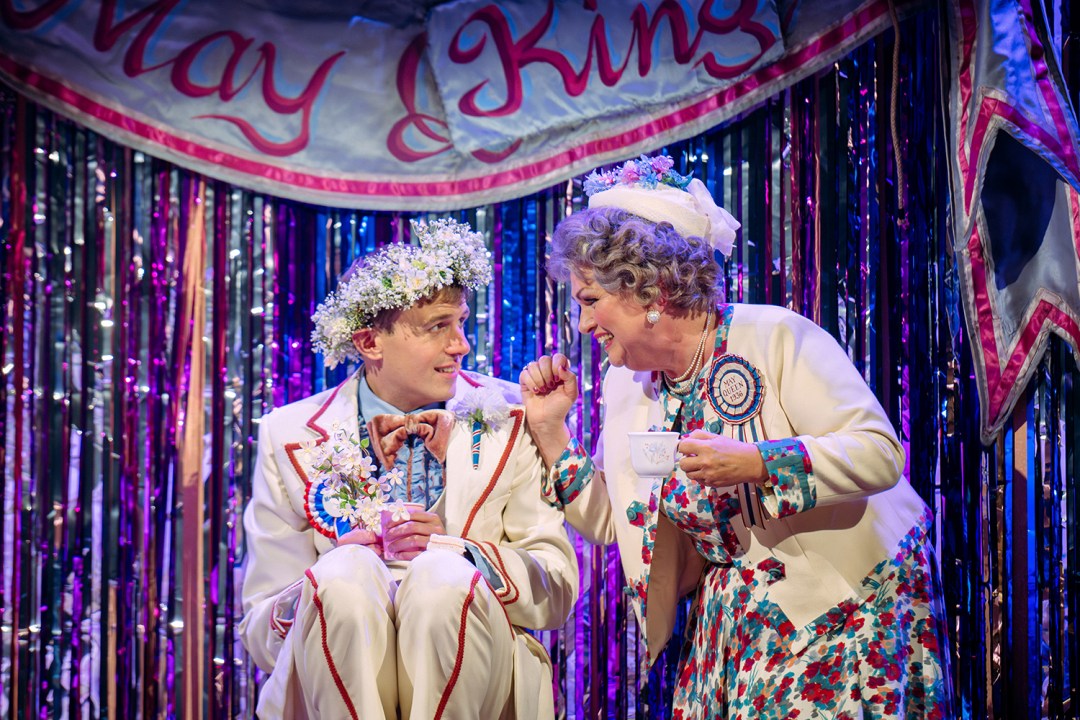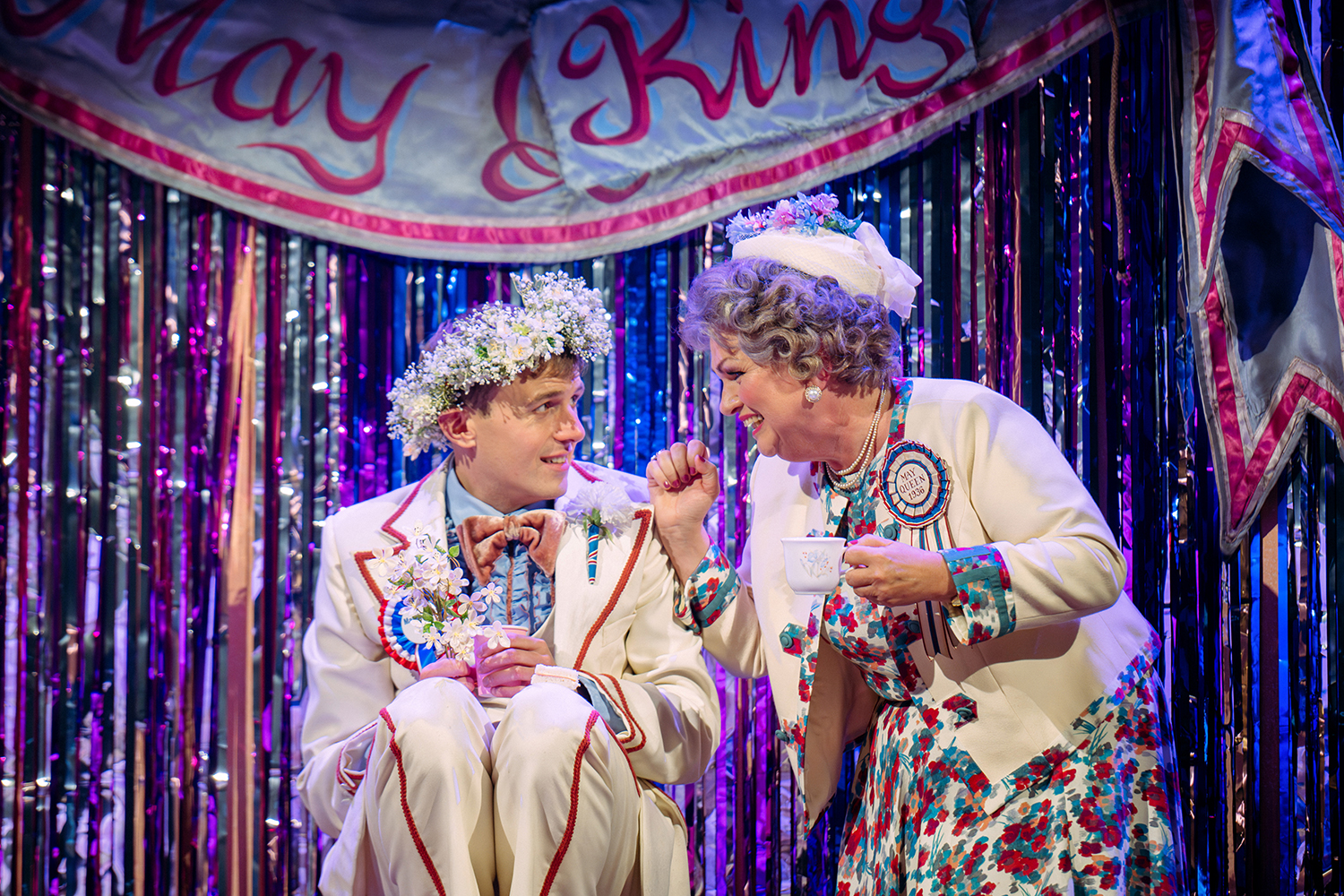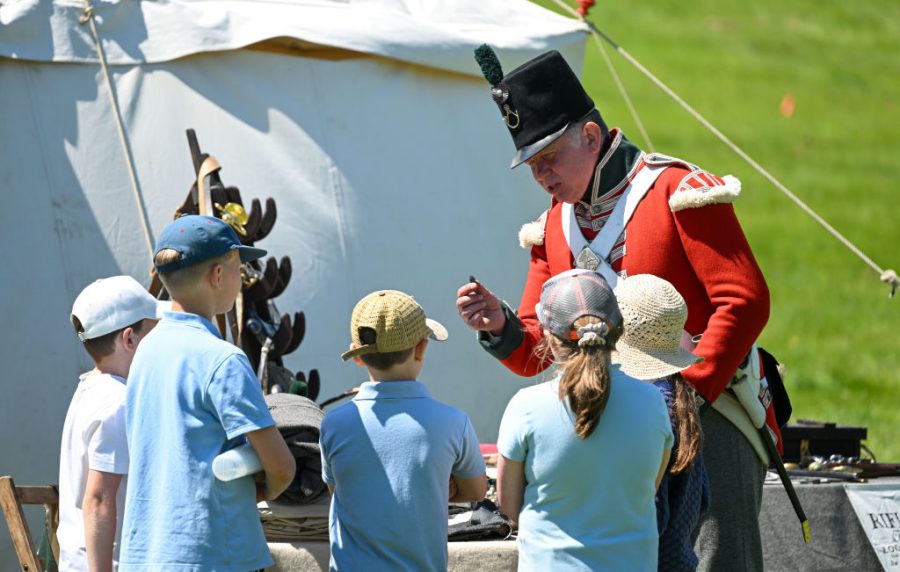Scottish Opera’s new production of Albert Herring updates the action to 1990, and hey – remember 1990? No, not particularly, and I suspect that’ll be a common reaction if you were actually around back then. The director Daisy Evans was a toddler at the time and she imagines a gaudy, tawdry small-town world of bum-bags, WeightWatchers and decrepit gas heaters. Loxford Village Hall looks like it hasn’t been redecorated since the year the opera was composed, 1947, and that certainly rings true. Blancmange for the May Day feast, though? I’m pretty sure that even under John Major, blancmange was a throwback. But Evans has a show to put on after all, and a pink wobbling gelatine-based dessert is more theatrical than a bowl of Monster Munch.
One minute you’re cheering the fall of the Berlin Wall, next you’re a younger generation’s idea of retro-kitsch
Still, that’s how it goes. One minute you’re cheering the fall of the Berlin Wall, next thing you’re a younger generation’s idea of hilarious retro-kitsch. Is anything gained by setting Albert Herring in the 1990s, as opposed to the period of composition or even (imagine!) the late Victorian England that Britten and his librettist Eric Crozier actually specified? Not really, but Britten’s score is pretty much indestructible and Evans’s direction is so lively and imaginative that it disarms almost all misgivings.
The cast, too, is notably fresh (several of the singers are members of Scottish Opera’s Emerging Artist programme), and as Lady Billows, Susan Bullock bounces the younger characters’ energy straight back at them – trilling out her edicts to the community, and dropping to a throaty Mrs Thatcher gurgle when a touch of steel is required. I quite liked the idea of Sid (Ross Cumming) as the bloke who runs the local meat raffle, and with his novelty waistcoat and taste for the spotlight, Francis Church’s Mr Gedge is a grimly recognisable C of E vicar.
Mrs Herring (Christine Sjölander), meanwhile, really rocks those leg warmers, and the village kids Emmie, Cis and Harry are, well, whatever you’d call the Suffolk equivalent of Derry Girls: lairy, vodka-swigging little hoydens, played and sung with spiky relish by Sarah Power, Audrey Tsang and Cliona Cassidy. Albert himself is sung by Glen Cunningham with a likeable blend of sweetness, diffidence and (ultimately) resolution; while as Nancy, Chloe Harris has a mezzo as juicy as one of Albert’s peaches. Edward Jowle, as the village copper, combines a suitably blacked and polished bass-baritone with a youthful vigour that makes it wholly plausible that (in a subplot invented by Evans) he’d catch the eye of Mrs Herring, who in this retelling is the village cougar.
That, far more than the updating, is Evans’s most radical intervention in the world of this opera – the fact that the whole community is having it every which way. Lady Billows laces her tea with gin, Albert’s mum is permanently on the lash, and in the general atmosphere of sap rising the collective concern over Albert’s moral purity doesn’t look hypocritical so much as implausible.
But who’s counting when everyone seems to be having such a good time? Even the orchestra: William Cole conducted, and each of the 13 musicians played as if they too were characters in the comedy (the bassoonist sounded particularly up for it). They were all wearing greengrocer’s tabards – a cute touch that didn’t prevent them from conjuring sounds of haunted, nocturnal tenderness during the brief stretch where the action takes a darker turn. This good-natured production was premièred at September’s Lammermuir Festival, but the Glasgow audience laughed a lot, and if there’s any justice it’ll be revived and toured far beyond this brief main-stage run.
At the Wigmore Hall, injury forced Andras Schiff to withdraw from a recital with a group of players from the Kronberg Academy; a sort of Top Gun outfit in the Rhineland for aspiring chamber musicians. But Enrico Pace, who took his place, is an enormously experienced and sensitive pianist, and his playing was a model of musical partnership at its most supportive. The violinist Sarah Jégou-Sageman performed Debussy’s sonata with the muscular sweep and chrome-plated lustre of a young Anne-Sophie Mutter. Pace sketched in a backdrop of subtle greys and charcoal-smudges, then did his best to untangle the contrapuntal thickets when the cellist Bryan Cheng joined them in Schumann’s G minor Piano Trio.
After the interval, two different string players – violinist Oliver Neubauer and cellist Alexander Warenberg – joined Pace for Beethoven’s Archduke Trio. They seemed a better-matched group, pouring out bronzed, sculpted string tone (with some deliciously nutty pizzicati) and drawing inspiration from each other’s playing as they scrolled through the Trio’s kaleidoscope of colours and emotions. And the Archduke really does have it all: sunlit lyricism, knockabout humour, deep prayer and – at the last – whirling, reckless glee. Beethoven, ultimately, was the biggest personality in the room. He always is.








Comments